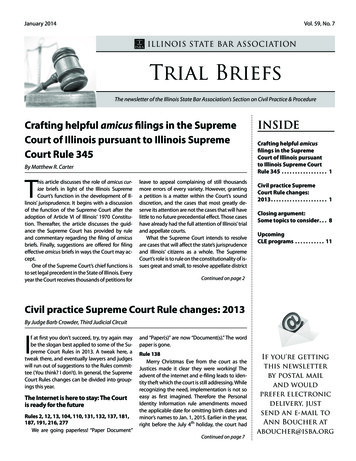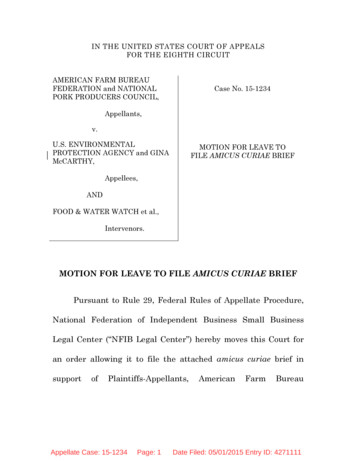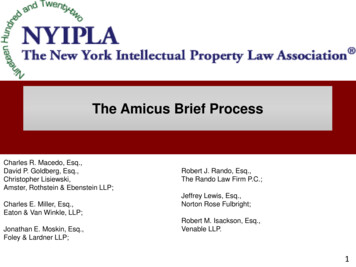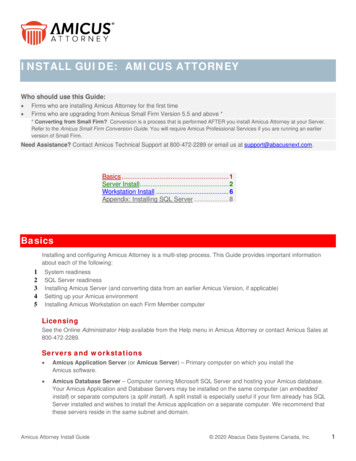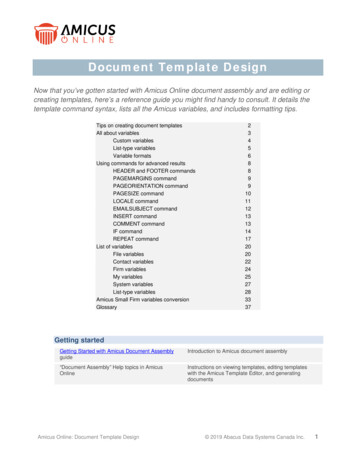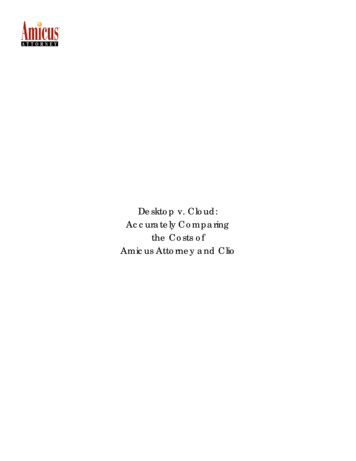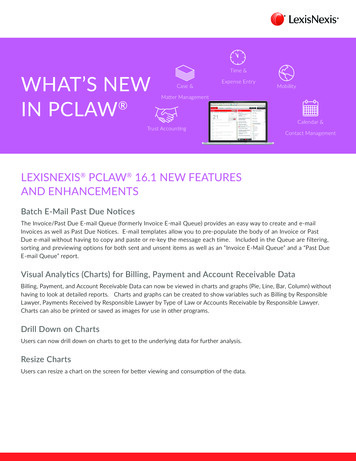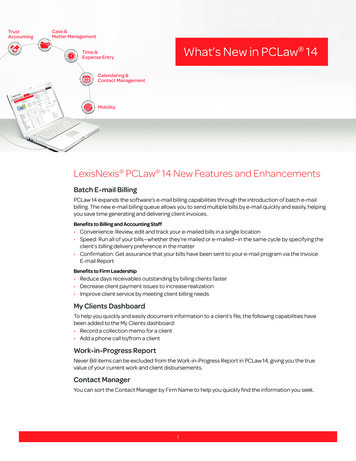![[Proposed] Amicus Curiae Brief Of The Foundation For Taxpayer And .](/img/59/cwfogelac.jpg)
Transcription
Case No. B182156IN THE COURT OF APPEALFOR THE STATE OF CALIFORNIASECOND APPELLATE DISTRICTDIVISION FOURBENJAMIN J. FOGEL, ET AL.,Plaintiff and Appellant;v.FARMERS GROUP, INC., D/B/A FARMERS UNDERWRITERS ASSOCIATION,FIRE UNDERWRITERS ASSOCIATION, TRUCK UNDERWRITERS ASSOCIATION,Defendants, Respondents, and Cross Appellants.Appeal from the Superior Court of the State of California in and for theCounty of Los Angeles, Case No. BC300142(The Honorable Peter D. Lichtman, Judge)[PROPOSED] AMICUS CURIAE BRIEF OFTHE FOUNDATION FOR TAXPAYER AND CONSUMER RIGHTSHARVEY ROSENFIELD, ESQ. (SBN 123082)PAMELA M. PRESSLEY, ESQ. (SBN 180362)THE FOUNDATION FOR TAXPAYER AND CONSUMER RIGHTS1750 Ocean Park Boulevard, Suite 200Santa Monica, CA 90405Tel. (310) 392-0522Fax (310) 392-8874
TABLE OF CONTENTSTABLE OF CONTENTS .iINTRODUCTION & SUMMARY OF DISCUSSION . 1BACKGROUND. 7A. Structure of the Relationships Between Policyholders,Subscribers, and FGI and the Exchanges; the AIF Fee. . 7B. The Pre-Proposition 103 Insurance Code Denied Consumers theRight to Challenge Insurer Misconduct in the Courts. . 10C. Proposition 103 Replaced McBride-Grunsky with a RegulatoryFramework that Holds Insurance Companies Accountable in theCourts. . 151. How Proposition 103 Regulates Rates, Premium andUnderwriting Practices. 16a. Rates. 16b. Expenses. . 17c. Premiums. 182. Proposition 103 Repealed the Insurance Industry’sImmunity from the Antitrust Laws, Replacing it with NarrowExceptions. . 19i
3. Proposition 103 Created a Broad Private Right of Actionand Eliminated the Commissioner’s Exclusive Jurisdiction. 20DISCUSSION . 22I. Walker and the “Filed Rate Doctrine” Do Not Apply to This Case. . 22A. FGI Is Not An Insurance Company Regulated by Proposition 103and Has Not Filed Any Rates. 22B. The AIF Fee is not a “rate.”. 23C. Neither the AIF Fee Nor the Management Services AgreementWas Filed Or Approved. . 261. The AIF Fee Was Neither Filed Nor Approved. . 262. The Management Services Contract was Neither Filed NorApproved. . 283. There Can Be No Approval of That Which Is NotSpecifically Disclosed. . 30II. This is Not An Insurance Rate Case, But if it Were, the Court ShouldHave Followed Farmers and Referred it to the Commissioner. 31III. Even If This an Insurance Rate Case, Sections 1860.1 and 1860.2 DoNot Bar a UCL Action Against Insurance Companies. . 34A. Proposition 103 Did Not Alter the Meaning or Expand the Scopeof Sections 1860.1 and 1860.2. . 35ii
B. The Walker Construction of Sections 1860.1 and 1860.2 ViolatesGrammar and Logic. . 39IV. There Is No Filed Rate Doctrine for Insurance Rates in California. . 42A. There is No Statutory Tether in Proposition 103. 42B. The Filed Rate Doctrine Is Inconsistent With Proposition 103Case Law and Other Authorities. . 43C. The Filed Rate Doctrine Would Conflict with the Purposes SetForth by the Voters in Proposition 103. 45CONCLUSION . 48iii
TABLE OF AUTHORITIESCasesFederalInterstate Commerce Commission v. Union Pacific Railroad Co. (1912)222 U.S. 541 . 24Wegoland Ltd. v. Nynex Corp (2003)27 F.3d 17 . 25California20th Century Ins. Co. v. Garamendi (1994)8 Cal.4th 216.16-17Bell v. Blue Cross of California (2005)131 Cal.App.4th 211 . 47Calfarm Ins. Co. v. Deukmejian (1989)48 Cal.3d 805 . 17, 18, 20Cortez v. Purolator Air Filtration Products Co. (2000)23 Cal.4th 163. 47Donabedian v. Mercury Insurance Co. (2004)116 Cal.App.4th 968 . passimFarmers Insurance Exchange v. Superior Court (1992)2 Cal.4th 377. passimFarmers Insurance Exchange v. Superior Court and Proposition 103Enforcement Project v. Safeco Insurance Co. of America (2006)137 Cal.App.4th 842 . 2, 5, 6Karlin v. Zalta (1984)154 Cal.App.3d 953 . 14, 15, 34, 37King v. Meese (1987)43 Cal.3d 1217 . 12, 48iv
Krumme v. Mercury Ins. Co. (2004)123 Cal.App.4th 924, . 47Lee v. Interinsurance Exchange of the Automobile Club of SouthernCalifornia (1996)50 Cal.App.4th 694 . 26Moradi-Shalal v. Fireman’s Fund Insurance Cos. (1988)46 Cal.3d 287 . 8Proposition 103 Enforcement Project v. Quackenbush (1998)64 Cal.App.4th 1473 . 17Southern California Edison Co. v. Peevey (2003)31 Cal.4th 781. 47State Compensation Insurance Fund v. Superior Court (2001)24 Cal.4th 930. 5, 6, 37-38State Farm Mutual Automobile Insurance Co. v. Garamendi (2004)32 Cal.4th 1029 . 31Stevens v. Superior Court (1999)75 Cal.App.4th 594 . 46Texas & Pac. Ry. v. Abilene Cotton Oil Co. (1907)204 U.S. 426 . 23, 42, 44The Foundation for Taxpayer and Consumer Rights v. Garamendi (2005)132 Cal.App.4th 1354 . 30Tran v. Farmers Group, Inc. (2002)104 Cal.App.4th 1202 . 9, 25-26Walker v. Allstate Indemnity Co. (2000)77 Cal.App.4th 750) . passimWayne v. Staples (2006)135 Cal.App.4th 466 . 8, 25Yamaha Corp. of Am. v. State Bd. of Equalization (1998)19 Cal.4th 1, 13 . 46v
StatutesFederal15 U.S.C. §§ 1011-1015 . 1015 U.S.C. § 1012(b). 12CaliforniaInsurance Code§ 22 . 8§ 790 . 14§ 1215.4 . 28§ 1215.5 . 28§ 1215.5(a)(1)-(2). 28§ 1215.5(b). 28§ 1215.5(b)(4) . 4, 28, 30§ 1280 et seq. . 33§ 1300 . 9§ 1301 . 9§ 1303 . 7, 22§ 1305 . 8, 9, 24§ 1850 (repealed by Prop. 103). 11, 12§ 1852 (repealed by Prop. 103). 11, 14§ 1852(d) (repealed by Prop. 103) . 12§ 1853 (repealed by Prop. 103). 11, 19§ 1853.5 . 19§ 1853.6 (repealed by Prop. 103). 11, 19§ 1853.7 (repealed by Prop. 103). 11, 19§ 1853.8 . 19vi
§ 1854 - 1854.5 (repealed by Prop. 103). 19§ 1855 . 19§ 1856 . 19§ 1858 et seq. . 21§§ 1858-1859.1 (as existed prior to Prop. 103) . 13§ 1858.6 . 13, 14§ 1860.1 . passim§ 1860.2 . passim§ 1861.01 . 16§ 1861.02 . 16, 19§ 1861.03 . 47§ 1861.03(a) . 16, 19, 21, 37, 41, 43. 44, 45§ 1861.03(b) . 19§ 1861.03(c) . 16§ 1861.04 . 16§ 1861.05 . 3, 16, 24, 45§ 1861.05 et seq. 16, 20§§ 1861.05 - 1861.09. 3, 16, 24§ 1861.07 . 31§ 1861.10 . 47§ 1861.10(a) . 5, 16, 20, 21, 35, 37, 40, 43, 44§ 1861.12 . 16§ 1861.13 . 16, 22§ 11758 . 37§ 12900 . 20Civil Code§§ 51 - 53 . 21vii
Code of Civil Procedure§ 1094.5 . 13RegulationsCal. Code Regs., tit. 10, § 2632.5 . 19Cal. Code Regs., tit. 10, §§ 2644.1 et seq. 3, 25Cal. Code Regs., tit. 10, §§ 2644.1-.23 . 17Cal. Code Regs., tit. 10, § 2644.4-.14 . 17Cal. Code Regs., tit. 10, § 2644.9 . 17Cal. Code Regs., tit. 10, § 2644.10 . 18, 27Cal. Code Regs., tit. 10, § 2644.10(g). 18, 27Cal. Code Regs., tit. 10, § 2644.12 . 18Other AuthoritiesAngoff, “Insurance Against Competition: How the McCarran-Ferguson ActRaises Prices and Profits in the Property/Casualty Insurance Industry,”5 Yale Journal on Regulation 397 (1988). 11State of California, Department of Justice, Antitrust Guidelines for theInsurance Industry, March 1990, published in DiMugno & Glad,California Insurance Laws Annotated (Thomson-West 2006) . 44viii
INTRODUCTION & SUMMARY OF DISCUSSIONThough the Plaintiff did not allege any violation of Proposition 103,and no insurance company regulated by Proposition 103 is presently adefendant, the superior court treated Farmers Group, Inc. and its subsidiaryattorneys-in-fact (collectively “FGI”) as an insurance company, theattorney-in-fact fee (AIF Fee) as an insurance rate governed by Proposition103, and ruled that Walker v. Allstate Indemnity Co. (2000) 77 Cal.App.4th750 (Walker) immunizes FGI from accountability in the courts. Moreover,the trial court reasoned that the “filed rate doctrine” was consistent withWalker and applied it to this case – the first time that doctrine has ever beenapplied to the California Insurance Code. The court’s application ofWalker and the “filed rate doctrine” was a serious mistake of law thatcompels the attention of amicus curiae the Foundation for Taxpayer andConsumer Rights (FTCR).The principal issue presented by this appeal is whether the trial courterred in holding that Insurance Code sections 1860.1 and 1860.2,1 enactedby the Legislature in 1947, accord the Insurance Commissioner “exclusivejurisdiction,” or establish a “filed rate doctrine,” so as to bar a lawsuit thatdoes not challenge the filed rates of an insurer but rather the propriety of afee imposed by contract on customers by their attorney-in-fact andfiduciary FGI.The court below erred. The question of whether an UnfairCompetition Law (UCL) suit may be brought to challenge violations ofProposition 103 by insurance companies has been intensely litigated by theinsurance industry in recent years. This Court’s extensive analysis inDonabedian v. Mercury Insurance Co. (2004) 116 Cal.App.4th 9681All further references are to the Insurance Code unless otherwisespecified.1
(Donabedian) largely settled the issue. Donabedian confirms that thevoters expressly authorized such suits when they passed Proposition 103,and that sections 1860.1 and 1860.2 do not bar suit or liability.2 The courtbelow eschewed the Donabedian analysis, however. It relied instead uponthe erroneous reading of the statutes set forth in the First District’s decisionin Walker, which concluded that the sections 1860.1 and 1860.2 barred alawsuit against insurance companies challenging insurance rates approvedpursuant to the regulatory process established by Proposition 103.FTCR believes the court below erred by treating FGI as an insurancecompany and the AIF Fee as a “rate” subject to Proposition 103. By itsown terms, Walker, which was a Proposition 103 rate case, is whollyinapplicable to this case for three reasons.First, the present Defendants are not insurance companies. (SeeDiscussion, Section I-A.) Walker was a suit against insurance companieschallenging the rates they charged. The Defendants here are not insurancecompanies. FGI and its subsidiaries are attorneys-in-fact. The lawsgoverning the organization of reciprocal insurers like Farmers require thatthe AIF be a separate entity from the insurance company.Moreover, AIFs are not regulated as insurance companies byProposition 103 because the subscription agreement they enter into with asubscriber is not a “contract whereby one undertakes to indemnify anotheragainst loss, damage, or liability arising from a contingent or unknownevent.” (Section 22.) Proposition 103, which may be found in Chapter 92Farmers Insurance Exchange v. Superior Court and Proposition 103Enforcement Project v. Safeco Insurance Co. of America (2006) 137Cal.App.4th 842 (“Farmers/Safeco”) is in accord. It held that Proposition103 established a right of action to enforce Proposition 103 under the UCL,but held that there was no right to enforce the statutes directly. (Id. at 853,fn. 8 and 854.)2
of Part 2 of Division 1 (hereafter, Chapter 9) of the Insurance Code, doesnot regulate attorneys-in-fact, which are authorized by Chapter 3 of thatpart of the Insurance Code.Neither Walker nor the “filed rate doctrine” can apply to immunizethe actions of a company that does not file rates.Second, plaintiff’s lawsuit does not challenge an insurance rate.(See Discussion, Section I-B.) Walker barred a challenge to insurance ratesregulated by the Insurance Commissioner pursuant to Proposition 103.Fogel does not challenge as excessive any insurance rate or allege anyviolation of Proposition 103. Rather, Fogel challenges the AIF Feeimposed pursuant to a written contract – the Subscription Agreement –between the subscriber and FGI.The AIF Fee is not a rate. FGI’s authority to levy the AIF Feecomes neither from the Department of Insurance, nor from the provisions ofthe Insurance Code that govern the regulation of rates (sections 1861.05 1861.09, enacted by Proposition 103), but from a contract between FGI andsubscribers. The obligations that govern the subscriber and the attorney-infact are regulated by the terms of that agreement, not Proposition 103.Nor does Proposition 103 authorize the Commissioner to regulatethe specific expenditures of an insurance company. The regulationsimplementing section 1861.05 only specify what portion of an insurer’soverall expenses may be passed through to policyholders. (Cal. CodeRegs., tit. 10, § 2644.1 et seq.)If the ruling of the court below was correct, and approval of aninsurer’s rates immunized an insurer from any challenge to itsexpenditures, then even a slip-and-fall case would be barred, since thedamages would arguably be recognized as costs in the insurer’s rates.Third, even if the AIFs were considered insurance companies, andthe AIF Fee considered a “rate,” Walker does not apply because the AIF3
Fee was not disclosed to or approved by the Commissioner. (SeeDiscussion, Section I-C.) The Commissioner’s approval was the predicatefor the immunity Walker discerned (incorrectly) in the statutes. The recordhere affirmatively establishes that the Exchanges did not disclose, and theCommissioner did not approve, the AIF Fee.Nor is there anything in the record that suggests that theCommissioner received, much less reviewed, the management servicesagreement between FGI and the Exchanges that presumably specifies whatservices are provided to the Exchanges by FGI. In fact, amendments tosection 1215.5(b)(4), sponsored by Farmers Insurance Group after thepassage of Proposition 103, purport to relieve the Exchanges of theirobligation to submit certain of their management agreements to theCommissioner. The applicability of that statute to FGI’s currentmanagement agreements, and its interaction with the overriding disclosureand regulatory requirements of Proposition 103, cannot be determined here,because neither party raised this statute in this proceeding. But theamendments suggest that the company believes the Commissioner cannotregulate some of agreements between FGI and the Exchanges.While FTCR believes that this is a fiduciary duty case, not aninsurance rate case, the absence of the Exchanges deprived the lower courtof the information needed to ascertain that distinction. Indeed, if the courtbelow believed this to be an insurance rate case, the proper procedure, asdictated by the California Supreme Court in Farmers Insurance Exchangev. Superior Court (1992) 2 Cal.4th 377 (Farmers), would have been to staythe trial court proceedings and request that the Commissioner weigh in –not dismiss the case as barred.In the event that the Court concludes that this is an insurance ratecase and proceeds to address the statutory issue of whether insurancecompanies are immune from this suit by virtue of sections 1860.1 and4
1860.2, as Walker held, this brief also demonstrates that the trial court erredon that ground.The argument made by FGI and accepted by the court below – thatsuits under the Unfair Competition Law (UCL) challenging violations ofProposition 103 are prohibited by those statutes – has been repeatedlypresented by insurers to California courts in recent years. Each time,beginning with this Court’s decision in Donabedian, supra, 116 Cal.App.4th 968, the courts have rejected the argument, with one exception: Walker.Walker was decided incorrectly, and its statutory analysis cannot besquared with the Supreme Court’s subsequent decision in StateCompensation Insurance Fund v. Superior Court (2001) 24 Cal.4th 930(SCIF) and the far better reasoned authority of Donabedian, whichcorrectly construed the statutes.As explained in the Background section, Proposition 103, enacted bythe voters in 1988, eliminated the “exclusive jurisdiction” of the InsuranceCommissioner over insurance rates, premiums and practices; consumers areexplicitly authorized by Proposition 103 to bring an Unfair CompetitionLaw action against insurance companies in court for violations of Chapter 9(of Part 2 of Division 1 of the Insurance Code) by section 1861.10(a).(Farmers, supra, 2 Cal.4th 377; Donabedian, supra, 116 Cal.App.4th 968;see also Farmers/Safeco, supra, 137 Cal.App.4th 842, 853, fn. 8.) Thus, inthe context of Proposition 103, the vestigial provisions of the 1947 law nolonger operate to confer immunity from a UCL suit upon insurancecompanies. (Donabedian, supra, 116 Cal.App.4th 968 at 990-991; SCIF,supra, 24 Cal.4th at 938-940.) (See Discussion, Section III.)Further, the private right of action authorized by section 1861.10(a)of Proposition 103 is unconditional. There is no statutory basis upon whichto impose a “filed rate doctrine” upon Proposition 103. Such a doctrine isinconsistent with the language and purposes of Proposition 103, the5
Supreme Court’s decision in Farmers, and Donabedian. (See Discussion,Section IV.) This case does not allege a violation of any provision ofProposition 103, but if Proposition 103’s provisions were implicated,Proposition 103 explicitly authorizes this UCL suit.Walker’s construction of the relevant statutes and its reasoning aremanifestly incorrect, have been discredited by the California SupremeCourt and Donabedian, and this Court should reject its analysis.***Three times in the last three years, insurance company defendantsand insurance companies appearing as amici have asked the Second DistrictCourt of Appeal to judicially restore the era of “exclusive jurisdiction” andimmunity from suit that the voters swept away when they enactedProposition 103.3 Each time, the insurance companies have been rebuffed.Consumer advocacy groups like FTCR and the Insurance Commissionerhave demonstrated to the courts that the plain language, legislative historyand judicial construction of the relevant statutes establish the right to bringa UCL lawsuit against an insurer for violations of Proposition 103.43In addition to Donabedian, supra, 116 Cal.App.4th 968, the issue waslitigated in Poirer v. State Farm Mutual Automobile Insurance Co.(B165389) 2004 WL 2325837, and most recently in Farmers/Safeco, supra,137 Cal.App.4th 842.4FTCR filed extensive amicus briefs in Donabedian and Poirer (whichmay be found at 2003 WL 23209749 and 2004 WL 1284440 respectively)and was a party in Farmers/Safeco (the Plaintiff in the Safeco case, theProposition 103 Enforcement Project, is a project of FTCR). The InsuranceCommissioner filed amicus briefs in all three proceedings; his amicus briefin Donabedian is attached as Exh. A to FTCR’s Motion for Judicial Notice(MJN) (available at 2003 WL 23280980); his Poirer brief may be found at2004 WL 1284440.6
In this, the fourth time the argument has been presented to thisCourt, the insurer seeks to extend the Walker bar to a company that is not aregulated insurance company, and to a fee that is not a rate. Regardless ofFGI’s status, should the argument prevail here, the consequences will bedisastrous for consumers and the regulatory process, as the InsuranceCommissioner himself has repeatedly emphasized in briefs addressing thisvery issue.A ruling accepting and applying Walker’s reasoning would conflictwith this Court’s decision in Donabedian and jeopardize the right that thevoters reserved to themselves to prevent violations of the Insurance Code,to remedy such violations through civil actions, and to obtain refunds ofmoney improperly collected by insurers. Finally, such a ruling would placeFGI beyond the rule of law, neither regulated by the Commissioner noraccountable in the courts for breach of contract and fiduciary duties.The court below erred, and this Court should reverse the trial court’sruling.BACKGROUNDThis section will briefly review the unique relationships created by areciprocal insurance arrangement. It will then proceed to discuss thebackground needed to assess the statutory immunity issue, should the Courtreach it.A.Structure of the Relationships Between Policyholders,Subscribers, and FGI and the Exchanges; the AIF Fee.The entities that to the public appear as “Farmers Insurance” areseparate and distinct entities. The Exchanges – Farmers InsuranceExchange, Fire Insurance Exchange, and Truck Insurance Exchange – areinsurance companies, and serve as the vehicle through which insureds coinsure each other in a “reciprocal” arrangement. (Section 1303.) TheExchanges perform the principal function of insurance as it is defined by7
section 22: “shifting one party’s risk of loss to another party anddistributing that risk among similarly situated persons.” (Wayne v. Staples(2006) 135 Cal.App.4th 466, 475-476.)Plaintiff Fogel initially sued the Exchanges. However, theExchanges were dropped in the First Amended Complaint to avoid theimplications of Walker (rather than challenge its application and flawedreasoning). (Appellant Benjamin Fogel’s Op. Brf. (AOB) at 9.)The AIFs – Farmers Group, Inc. (dba Farmers UnderwritingAssociation), Fire Underwriters Association and Truck UnderwritersAssociation – execute the insurance contracts on behalf of the policyholderpursuant to a power of attorney, and are separate entities. (Section 1305.)The AIFs here are subsidiaries of FGI. (7 JA 1917.)Consumers have differing legal relationships with these separateentities, reflecting the unique nature of reciprocal insurance.Policyholders pay premiums to the Exchanges, and submit claims (7JA 1878) to the Exchanges. State law regulates the relationship betweeninsurance policyholders and insurance companies in manifold ways. Asdiscussed in greater detail below, the provisions of the Insurance Code thatregulate the rates, premiums and certain practices of property-casualtyinsurers, including automobile insurers, are contained principally in Article10 of Chapter 9 of Part 2 of Division 1 of the Insurance Code. Chapter 9was enacted by the Legislature in 1947 as the McBride-Grunsky RegulatoryAct of 1947, and Article 10 was enacted in 1988 by the electorate asProposition 103. Common law doctrines also regulate the relationshipbetween policyholders and the Exchanges. (See, e.g., Moradi-Shalal v.Fireman’s Fund Insurance Cos. (1988) 46 Cal.3d 287 [liability in tort forbad faith].)The consumer’s relationship with the AIFs, such as FGI, is distinctfrom the policyholder relationship with the insurers. The policyholder is8
considered a “subscriber.” (Sections 1300-1301.) The subscriber executesa “subscription agreement” appointing the attorney in fact. (Section 1305.)The AIF then becomes a fiduciary to the subscriber. (Tran v. FarmersGroup, Inc. (2002) 104 Cal.App.4th 1202.) Pursuant to that agreement, thesubscriber agrees to pay a fee to the AIF for its
Case No. B182156 IN THE COURT OF APPEAL FOR THE STATE OF CALIFORNIA SECOND APPELLATE DISTRICT DIVISION FOUR BENJAMIN J. FOGEL, ET AL., Plaintiff and Appellant; v. FARMERS GROUP, INC., D/B/A FARMERS UNDERWRITERS ASSOCIATION, FIRE UNDERWRITERS ASSOCIATION, TRUCK UNDERWRITERS ASSOCIATION, Defendants, Respondents, and Cross Appellants.
